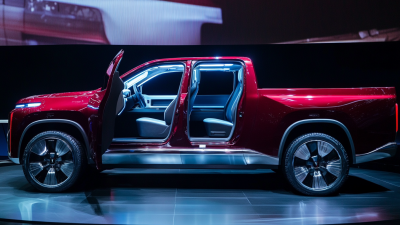Sorry. We did not find anything.
Benefits of Choosing Electric Car Brands for Sustainable Transportation Solutions
The rise of Electric Car Brands marks a significant turning point in the quest for sustainable transportation solutions. According to a report from the International Energy Agency, global electric vehicle sales surged to 6.6 million units in 2021, accounting for nearly 9% of all car sales worldwide, a considerable increase from just 4% in 2020. This trend highlights the shift towards greener alternatives, driven by advancements in battery technology and an increasing awareness of the environmental impact of traditional fuel vehicles. Electric vehicles (EVs) not only reduce greenhouse gas emissions but also lower operating costs, making them an economically attractive choice for consumers. As governments enhance incentives and charging infrastructure evolves, the benefits of embracing Electric Car Brands become ever more apparent, offering pathways to a cleaner and more sustainable future in transportation.

Top Reasons Why Electric Cars are Key to Sustainable Transportation
Electric cars are increasingly recognized as pivotal to sustainable transportation for several compelling reasons. Firstly, they produce zero tailpipe emissions, which significantly reduces air pollution. This is particularly crucial in urban areas, where vehicle emissions contribute considerably to health problems such as asthma and other respiratory issues. By choosing electric cars, consumers can play a vital role in improving air quality and promoting public health.
Moreover, electric cars contribute to the reduction of greenhouse gases, making them a key component in the fight against climate change. Traditional gasoline and diesel vehicles release a substantial amount of carbon dioxide, a leading contributor to global warming. In contrast, as the electricity grid becomes greener with renewable energy sources, the overall carbon footprint of electric vehicles continues to decrease. This shift not only underscores the importance of electric cars in creating a sustainable future but also aligns with global efforts to combat climate change and reduce reliance on fossil fuels.
Additionally, electric vehicles often come with lower operating costs, thanks to reduced fuel expenses and maintenance requirements. This economic benefit encourages more individuals and businesses to make the switch, further accelerating the transition to sustainable transportation solutions. Investing in electric car brands is not just an environmentally conscious choice; it’s also a smart economic decision that supports a healthier planet and society.
The Environmental Impact of Driving Electric: Reducing Carbon Footprint
The shift towards electric vehicles (EVs) has become a crucial component in the fight against climate change. By opting for electric car brands, individuals can significantly reduce their carbon footprint. Traditional gasoline cars emit a substantial amount of greenhouse gases, but EVs operate on electricity, which can be derived from renewable sources such as wind and solar power. This transition not only helps lower emissions but also reduces air pollution, contributing to a cleaner environment for all.
**Tips for Reducing Your Carbon Footprint with Electric Cars:**
1. Charge your EV during off-peak hours to take advantage of lower energy costs and reduce the load on the grid.
2. Consider using a home solar power system to charge your vehicle, minimizing reliance on fossil fuels.
3. Engage in eco-driving practices—smooth accelerations and decelerations can enhance your EV’s range, making every charge last longer.
Choosing electric car brands is not only a smart financial decision but also an essential step towards a sustainable future. By embracing this change, drivers can celebrate not just the performance and efficiency of modern vehicles, but also their role in preserving the planet for future generations.
Benefits of Choosing Electric Car Brands for Sustainable Transportation Solutions
| Aspect | Electric Cars | Conventional Cars |
|---|---|---|
| Average CO2 Emissions (g/km) | 0 | 120 |
| Fuel Cost per 100 km ($) | 2.00 | 8.00 |
| Maintenance Cost per Year ($) | 400 | 800 |
| Battery Recycling Rate (%) | 90 | N/A |
| Range (km) | 400 | 600 |
| Government Incentives ($) | 7,500 | 0 |
Financial Incentives for Choosing Electric Car Brands: Save Money While Saving the Planet
As more consumers shift towards sustainable transportation, the financial incentives for choosing electric car brands have become increasingly attractive. According to the U.S. Department of Energy, electric vehicles (EVs) can save drivers an average of $800 per year on fuel costs compared to gasoline vehicles. Additionally, federal tax credits of up to $7,500 significantly lower the upfront purchase price of many EV models, making them financially appealing. States like California and New York also offer additional rebates, which can further enhance savings, enabling consumers to save thousands over the life of their vehicle.

Moreover, the long-term financial benefits extend beyond purchase incentives. A study by the International Council on Clean Transportation found that EV owners typically spend 60% less on maintenance compared to internal combustion engine vehicles, due to fewer moving parts and the reduced wear and tear. With advancements in technology and an expanding network of charging stations, electric cars not only contribute to a greener planet but also represent a savvy investment for budget-conscious consumers looking to minimize their reliance on fossil fuels.
How Electric Cars Enhance Urban Mobility and Reduce Traffic Congestion
Electric cars are rapidly transforming urban mobility, offering innovative solutions to one of the most pressing issues in today's cities: traffic congestion. According to a report from the International Transport Forum, shifting to electric vehicles (EVs) could reduce urban traffic congestion by as much as 30% in densely populated areas. This reduction is primarily attributed to the efficiency of electric vehicles, which typically have lower operating costs and encourage shared mobility initiatives, such as car-sharing and ride-hailing services.
Furthermore, the integration of electric cars into public transportation systems has proven beneficial. A study published by McKinsey & Company found that electrifying bus fleets could reduce emissions by up to 80% while also decreasing traffic congestion by optimizing route performance. By replacing traditional buses with electric options, cities can not only achieve sustainability goals but also improve the overall efficiency of their transport networks. This dual approach of enhancing public transit with electric vehicles fosters a more connected and less congested urban environment, ultimately leading to a better quality of life for residents.

The Future of Transportation: Innovations in Electric Vehicle Technology to Watch for
The electric vehicle (EV) market is rapidly evolving, driven by innovations that promise to redefine the future of transportation. According to a report by the International Energy Agency (IEA), the global electric car stock reached 10 million units in 2020, and it is projected to grow significantly, with estimates suggesting 145 million electric cars on the road by 2030. This surge is largely fueled by advancements in battery technology, which not only enhance vehicle range and performance but also contribute to lower costs. For instance, battery prices have plummeted by nearly 89% since 2010, making electric vehicles more accessible to consumers than ever before.
Moreover, the integration of smart technologies into electric vehicles is paving the way for a more interconnected transportation ecosystem. Innovations such as vehicle-to-grid (V2G) technology allow EVs to communicate with the power grid, enabling energy storage and reducing demand during peak times. According to a study by McKinsey & Company, V2G systems could lead to a potential savings of up to $2.5 billion annually in the U.S. alone by 2025. With these advancements, electric cars are not just an alternative mode of transport; they are becoming a critical component of sustainable urban mobility solutions, enhancing efficiency while minimizing environmental impact.
Benefits of Choosing Electric Car Brands for Sustainable Transportation Solutions
Related Posts
-

Unlocking the Benefits of E Trucks: A Comprehensive Guide for Your Business
-

Maximizing Efficiency with Electric Pickups: Insights from 2023 Industry Trends and Market Data
-

The Benefits of After Sales Support and Repair Costs for Fully Electric Cars Explained
-

How to Experience the Future of Transportation with New Electric Vehicles
-

2025 Global Electric Car Brands Overview and Competitive Analysis
-

Accelerating Fully Electric Cars Innovation at the Successful Conclusion of 137th Canton Fair
